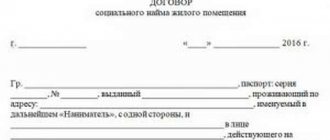The concept of an assignment agreement (cession)
The assignment of the right to claim an apartment in shared construction is associated with some risks for the person who decides to purchase an apartment in this way. Therefore, you need to understand the procedure for concluding such an agreement, take into account all the nuances and possible negative consequences of not complying with the mandatory conditions.
To prevent this from happening, we will examine all these issues in this article. Let's start with the definition of the very concept of an agreement for the assignment of a claim (assignment agreement). the agreement can be found at the link at the bottom of the article. According to the assignment agreement, the shareholder assigns to the other party (assignee) its rights and obligations under the equity participation agreement.
This legal mechanism for the sale of housing under construction in a new building is very popular among investors. They, as a rule, buy apartments in whole blocks from the developer at the stage of laying the construction of a house under construction. Naturally, they sell apartments in a new building at a higher price than they purchased. This is the meaning of investing - making a profit.
We recommend reading
Contract for chartering a bus and other vehicle for transporting children
It is also not uncommon for ordinary citizens, without waiting for the completion of construction, to sell square meters in a new building through assignment. The reasons may be different. However, the assignment in this case will help to avoid fines from the developer upon termination of the share participation agreement, as well as to receive a certain profit.
Download other examples of assignment of rights agreement: debt claims between legal entities; lease of land → sample; financing for the assignment of the right to a monetary claim → sample.
Features of compilation
When concluding an assignment agreement, you need to take into account some of its features:
- By assignment, the buyer of an apartment in a new building receives all the obligations, as well as the rights of the assignor (the original shareholder). And after concluding the agreement, he is obliged to comply with all clauses of the share participation agreement;
- it is possible to conclude an assignment agreement (assignment of the right of claim) only before the completion of construction, that is, before the transfer of rights to real estate from the developer to the shareholder under the transfer deed;
- the contract is concluded in writing. Notarization is not required;
- it is necessary to take into account that the shareholder must inform the developer in advance of his intention to assign the rights to the apartment;
- The direct participation of the construction company in concluding an assignment agreement is not necessary. But some developers directly state in the share participation agreement that their consent to the assignment is required. Then the participation of the construction organization will be mandatory;
- If at the time of signing the contract the shareholder has not made full payments for the apartment, the developer’s consent to the transaction is also required. And in the assignment agreement itself, in this case, it is necessary to specify the procedure for transferring the debt to the assignee to the developer.
What are the features?
The problem in concluding an assignment agreement arises if the apartment under the DDU was purchased with a mortgage.
The bank's consent is required here. When applying for a mortgage, the bank carefully checked the borrower, checking his solvency, health, age and even the number of alimony payments for men. Therefore, the bank has every right to refuse its consent if, after analyzing the solvency of the new borrower, it concludes that it is impossible for him to repay the cost of the mortgage in the future. Alexander MarushchenkoSenior lawyer
In this case, it is almost impossible to come to an agreement with the bank. However, it’s worth a try - offer him your terms, or additional guarantees of your solvency. And do not forget that after completing the assignment transaction, it is necessary to notify the developer as soon as possible, preferably within 10 days, by a valuable letter with an inventory of the assignment transaction.
For state registration of the assignment, a state fee of only 350 rubles is charged. both from legal entities and individuals, although the state registration of the preschool education itself cost legal entities 6,000 rubles, and individuals also 350 rubles. (Clause 30, Part 1, Article 333.33 of the Tax Code of the Russian Federation).
Sometimes you come across information that a state duty of 13% of the cost of a shared construction project is charged for the assignment - this is not true. Canceled by Federal Law No. 221 of July 21, 2014.
We will determine the benefits and risks of the assignment for all its participants.
- The seller (assignor) does not risk anything; he receives his funds in advance, even before the state registration of the assignment transaction. The amount he receives is much more than what was paid under the DDU, even taking into account bank interest. Thanks to the possibility of assignment, the assignor transfers his real estate, not even built yet, into liquid form and can dispose of it at his own discretion. For example, by investing in a new DDU;
- The assignee has much more risks, but also more benefits.
Assignee risks:
- risk of transaction invalidity. To prevent such a turn of events, it is necessary to abandon the transaction with any preliminary agreement (purchase and sale agreement, PSA). These contracts do not undergo state registration, and there is a possibility of double sales. The assignment agreement registered with Rosreestr excludes double sales. It is also necessary to ensure the legal capacity of the seller (assignor) before the transaction. If the assignor is minors (such cases have already happened many times, and have even been noted in judicial practice), then the assignment is made only with the permission of the guardianship authority of the region in which the assignor is registered;
- the risk of non-payment by the assignor of the entire amount under the DDU. To prevent such a turn of events, before the transaction it is necessary to carefully check all receipts confirming payment by the assignor of the entire amount; it is advisable to check this also in the developer’s office;
- the risk of failure to deliver the house, long-term construction, bankruptcy, liquidation of the developer, suspension of its activities by decision of the arbitration court. To prevent such an assignment, it is necessary for the assignee to study the developer in advance, even before the transaction is completed. The easiest way is to go to the developer’s website, where, in accordance with the requirements of the Law, the following must be presented: permits for the commissioning of objects previously built by this developer, an audit report for the last year, a construction permit, an examination report of project documentation, documents confirming rights developer for a land plot, a project declaration, the conclusion of a regulatory body on the compliance of the developer and the project declaration with the requirements established by the Law, a project of a building construction project that meets the requirements, the methods chosen by the developer to ensure the fulfillment of obligations under the building block construction agreement (bank guarantees or insurance from an insurance company) and photographs of the apartment building itself being built at home (under Part 2 of Article 3.1 of the Law). Studying these documents will immediately allow you to weed out dubious developers and not risk your money.
- the assignee also freezes his capital; he does not have the opportunity to use his liquid property these six months before the house is handed over and resold to another person. Although it could be invested in another, perhaps even more profitable business.
Similar to the transfer scheme under an agreement for the assignment of an apartment purchased under the DDU, the shareholder can transfer a penalty for late delivery of the house. What is the point and why is this beneficial for law firms? The fact is that the shareholder cedes his right to a legal entity, and the case automatically ends up in an arbitration court, which deals with disputes between organizations.
Alexander MarushchenkoSenior lawyer
Arbitration extremely rarely reduces the amount of the required penalty on applications of legal entities to developers, which is confirmed by numerous cases from judicial practice. As a result, the shareholder has a real chance to receive compensation significantly higher than what he can recover himself.
Those. By assigning the right to claim a penalty, the shareholder:
- Receives some part of the penalty amount
- Saves money on conducting business through lawyers
- Saves time on court cases
- The risk of reducing the penalty under Art. 333 Civil Code of the Russian Federation.
When a citizen has signed an equity participation agreement (DPA) with the Developer, he has the right to demand a certain apartment from the Developer within a certain period. The developer, in turn, is obliged to build an apartment building in the future and transfer this apartment to the shareholder. For this, the shareholder transferred a certain amount of money for construction.
The shareholder may assign his right of claim to someone - Art. 11 of Federal Law N 214-FZ. To cede not the apartment itself, but precisely the right to demand it from the Developer. Assigns the right for a certain amount, i.e. as if “selling”. To do this, you need to draw up a contract or assignment agreement. The equity holder will act as a assignor, and the one who buys the claim will be an assignee (Clause 1 of Article 388 of the Civil Code of the Russian Federation). For simplicity, I call them sellers and buyers.
We suggest you read: Sick leave for child care (sick leave) for a grandmother to care for her grandson, how many days
After the assignment is completed, the previous shareholders are not liable on the part of the Developer to the new shareholders. For example, if the developer misses the construction deadline, the area of the apartment will not correspond to the documents, etc. — all claims are now made only by new shareholders.
Sellers can be individuals or companies. The seller may be an investor. He formalized the DDU with the Developer at the foundation pit stage. When the house is already or almost built, he can sell this apartment at a higher price. It happens that the developer himself issues a DDU for “his” person or company. There are many cases.

An agreement on the assignment of rights can only be drawn up if the sellers have NOT yet signed the transfer and acceptance certificate - clause 2 of Art. 11 of Federal Law N 214-FZ. And it makes no difference whether the Developer put the house into operation or not.
If the sellers have already signed the acceptance certificate, then they have already received the apartment from the Developer. First, they register the apartment as their property, and then they can sell it under a purchase and sale agreement. There is no other way. Once the deed is signed, there can be no assignment.
Almost every Developer specifies in the share participation agreement that sellers can assign their rights only with his written consent. And more often than not he demands money for it. Although no cost of consent is specified in the DDU. The amount depends on the greed of the Developer - from 20 to 200 thousand rubles. Some take a percentage of the transaction for consent - from 2% to 5%.
Read the instructions - How to register an apartment in a new building as your property. After registering the apartment as your property, you can register in it and register someone else.
Many savvy sellers immediately add the cost of consent to the price of selling the apartment by assignment. Those. Buyers will ultimately pay for everything.
There is no need to ask the Developer’s consent if the sellers have paid him in full - clause 1 of Art. 11 of Federal Law N 214-FZ. Even if the Developer directly indicated his consent in the DDU, this requirement is still illegal on the basis of clause 1 of Art. 16 of the Law on Protection of Consumer Rights. Also, the Developer does not have the right to demand that only he draws up the assignment agreement.
If buyers have a mortgage, then their bank will still require consent from the Developer, if so stated in the DDU. Without consent, the bank simply will not approve the mortgage and will not give the buyers money.
There is also this problem: the assignment agreement under the DDU must be registered with the Registration Chamber - Art. 17 Federal Law N 214-FZ. And most registrars will still require the Developer’s consent if this is indicated in the share participation agreement. They will refer to clause 2 of Art. 382 of the Civil Code of the Russian Federation. As a result, the registrar will suspend the transaction for a month. If consent is not given within this time, the documents will be returned with a refusal to register.
What to do? There are two paths that the parties themselves decide which one to choose:
- Pay the Developer for consent. You can try to bargain with him. With consent, there will be no suspensions in registration. The parties themselves must discuss who pays for consent and how much;
- Or submit an assignment agreement without consent and hope that registration will be successful. Sometimes it goes away, but more often they will require consent. If the local Registration Chamber suspends the transaction, you can sue it. After all, the requirement for consent is illegal. The trial will be on the buyers' side, but it will last about 4 months. But not everyone is ready to wait that long. Also, the services of a lawyer for drawing up a claim and conducting a case cost money.









